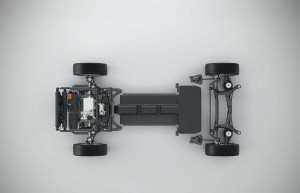
Volvo CEO Hakan Samuelsson expects development and production costs to drop with the new joint venture with Geely and Lynk.
With its profits climbing 21.4% in the first half of 2017, Volvo Cars is planning to set up a new joint venture technology company with Geely Holding. The new deal is designed to reduce development and production costs.
Volvo’s venture with the Chinese car group is to “share existing and future technology, deepen industrial synergies and provide the economies of scale that will allow them to more rapidly develop next generation electrified vehicle technology,” the two companies said in a joint statement.
Volvo Cars, Geely Auto and Lynk & Co. will share vehicle architecture and engine technologies through cross licensing arrangements of technologies managed by the new joint venture. The new partners will also commonly sourcing components cutting procurement costs.
Sweden-based Volvo announced recently that going forward all of its future models would reach the market with an EV or hybrid powertrain.
“Partnerships to share know-how and technologies are common practice in the automotive industry. This is the model we are adopting,” said Håkan Samuelsson, president and chief executive officer. “This planned collaboration will strengthen Volvo’s ability to develop next generation electrified cars.”
(Volvo parent Geely buys flying car start-up Terrafugia. Click Here for the details.)
The collaboration will also cover future components for electrified vehicles such as battery cells, e-motors and charging systems in order to maximize synergies across the group. Volvo Cars and Geely already share technology, most notably the Compact Modular Architecture which is being used by Volvo Cars for its soon-to-be-announced smaller range of 40 series cars and by Lynk.

Volvo's all-electric version of its CMA platform is technology it will now share under this new deal.
The three companies in the agreement are controlled by Geely Holding. The new joint venture will be 50/50 owned by Volvo Cars and Geely Holding and be headquartered in China with a subsidiary in Gothenburg, Sweden.
The intellectual property rights for the technology to be shared will remain with the company that developed it, but the technology itself will be available for use by Volvo, Geely Auto and Lynk.
Future modular vehicle architectures and other technology will be shared and developed based on cost sharing agreements. The company leading the development will own the technology and the other group companies will have full access to it through a license, reducing overall development costs.
Separately, it is also announced today that Volvo is to take a significant minority shareholding in Lynk. This stake reflects the fact that LYNK & CO will benefit from the use of Volvo technology both now and in the future. LYNK & CO will be jointly owned by Geely Holding, Geely Auto and Volvo Cars.
Li Shufu, chairman of Geely Holding said, “We will unlock significant benefits across our portfolio by sharing both technologies and next-generation vehicle architectures. I am confident these synergies can be achieved while preserving the separate identities and strategic autonomy of our different automotive brands.”
Volvo Cars has reported strong growth in operating profit in the first half of 2017, after taking market share across Europe and experiencing a robust sales increase in China.
(Click Here for more about Volvo’s electrification plans.)
Revenues rose increased by 17% in the first six months of 2016, while the operating profit margin improved to 6.8% from 6.6% a year earlier, even as the company continues to invest heavily in new cars and technologies.
Sales for the first six months of the year increased 8.2% compared to the same period last year to 277,641 cars. The first half increase in sales means Volvo Cars remains firmly on course for a fourth consecutive record year.
“We have reported strong profits at the same time as making ongoing investments in our transformation,” said Samuelsson.
During the first half of 2017, the company took market share in the EMEA region, following healthy growth in several key markets. Sales were up by 6.6% during the period.
In the Asia Pacific region and China in particular, Volvo outperformed the market. Sales in the region increased by 22.6%, while China sales were up 27.6%.
In the U.S., Volvo Cars expects to report solid full-year growth after a strong second half of the year. Delivery constraints affected first quarter sales, but a return to growth during the second quarter and the impending start of delivery of the new XC60 midsize SUV point to a stronger finish.
“Globally, we expect the pace of growth generated in the first half of the year to continue. We are confident we will report another record year in terms of sales,” said Samuelsson.
(To see more about Volvo’s relaunch of Polestar as a high-performance EV brand, Click Here.)
Later this year, Volvo Cars will launch its all-new XC40, its first entry into the small premium SUV segment, completing the company’s SUV line-up.
